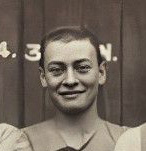Julian Orlov
| Alias | David Gulian Weinberg; David Julian Weinburg; (Orlov - correct name) |
|---|---|
| Russian spelling | Юлиан Орлов; Давид Юлиан Вейнберг |
| Born | 21.10.1896 |
| Place | Moscow, Russia (naturalisation); Lodz, Poland (enlistment) |
| Ethnic origin | Jewish / Russian |
| Religion | Russian Orthodox (WWI), Roman Catholic (WWII) |
| Father | W.B. Weinburg (Weinberg) |
| Family | Wife Mary Bridget Orlov (née Macfarlane), married 1925 |
| Residence before arrival at Australia | Was a university student in Moscow; in 1915 served in Zion Mule Corps at Gallipoli for 3 months, was wounded |
| Arrived at Australia |
from Egypt on 09.1915 per Natata disembarked at Newcastle, NSW |
| Residence before enlistment | Newcastle, NSW |
| Occupation | Farmer |
| Naturalisation | 1921 |
| Residence after the war | Wollongbar, Bilambil, Tweed River, NSW |
| Died | 1965, Carool, Tweed River, NSW |
Service #1 – British Army
| Enlisted | 1915? |
|---|---|
| Place of enlistment | Egypt? |
| Unit | Zion Mule Corps |
| Rank | Private |
| Place | Gallipoli, 1915 |
| Casualties | WIA 1915 |
| Discharged | 1915 |
Service #2
| Service number | 581 |
|---|---|
| Enlisted | 18.01.1916 |
| Place of enlistment | Newcastle, NSW |
| Unit | 34th Battalion |
| Rank | Private, Lance Corporal, Corporal, Sergeant |
| Place | Western Front, 1916-1917 |
| Casualties | WIA 1917 |
| Awards | Mentioned in despatches for conspicuous bravery and gallantry in June 1917 offensive |
| Final fate | RTA 16.12.1917 |
| Discharged | 14.08.1918 MU |
Service #3 – WWII
| Service number | Q140361 |
|---|---|
| Enlisted | 3.03.1942 |
| Place of enlistment | Brisbane |
| Unit | 7 Tng Battalion |
| Rank | Lance Corporal |
| Discharged | 16.11.1942 |
Materials
Digitised naturalisation (NAA)
Digitised service records (NAA) (Orlon)
Digitised Embarkation roll entry (AWM) (Weinburg)
Application for admission of relatives and friends 1 2 (NAA)
Personal case file (WWI) 1 2 3 (NAA)
Digitised WWII service records (NAA)
WWII service medical documents (NAA)
Group portrait of members of the 34th Battalion at Bulford Army Camp. P09102.001 (AWM)
Blog article
Newspaper articles (selection)
Soldier settlers. - Tweed Daily, Murwillumbah, 24 February 1921, p. 2.
Soldier settlers. - Tweed Daily, Murwillumbah, 13 June 1923, p. 4.
Cattle poisoned. - Tweed Daily, Murwillumbah, 2 March 1927, p. 2.
Banana industry. - The Sydney Morning Herald, 5 February 1938, p. 8.
Additional evidence. Inquiry into fruit industry. - Tweed Daily, Murwillumbah, 7 February 1938, p. 3.
What is meant by postwar reconstruction?. - Tweed Daily, Murwillumbah, 30 November 1943, p. 2.
Pensioners. - Tweed Daily, Murwillumbah, 7 December 1943, p. 2.
Question of preference. - Tweed Daily, Murwillumbah, 14 December 1943, p. 2.
Postwar works programmes. - Tweed Daily, Murwillumbah, 21 December 1943, p. 2.
Some factors affecting land settlement. - Tweed Daily, Murwillumbah, 28 December 1943, p. 2.
Decentralisation of government's executive powers. - Tweed Daily, Murwillumbah, 4 January 1944, p. 2.
Upbringing of children. - Tweed Daily, Murwillumbah, 12 January 1944, p. 2.
Difference between education and schooling. - Tweed Daily, Murwillumbah, 18 January 1944, p. 2.
Lack of thought at root of social unrest. - Tweed Daily, Murwillumbah, 25 January 1944, p. 2.
Distribution of our produced wealth. - Tweed Daily, Murwillumbah, 1 February 1944, p. 2.
Must not use economical terms loosely. - Tweed Daily, Murwillumbah, 8 February 1944, p. 2.
Use of credit. - Tweed Daily, Murwillumbah, 15 February 1944, p. 2.
Babies first need in baby welfare. - Tweed Daily, Murwillumbah, 13 March 1944, p. 4.
From Russian Anzacs in Australian History:
Julian Orlov was another political refugee who combined farming, on land at Bilambil soldiers' settlement (New South Wales), with his literary endeavours. Orlov had initially fought with the Zion Mule Corps and was wounded at Gallipoli before switching to the AIF, finally being severely wounded in France.
Gallery

Julian Orlov (David Julian Weinburg
P09102.001 (AWM)
 Russian Anzacs
Russian Anzacs